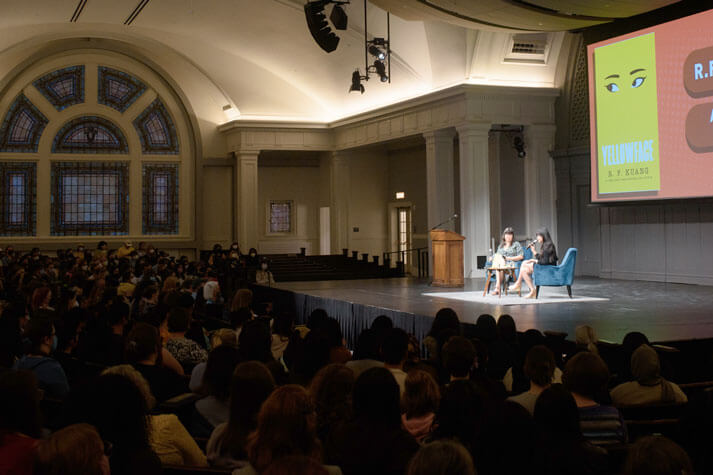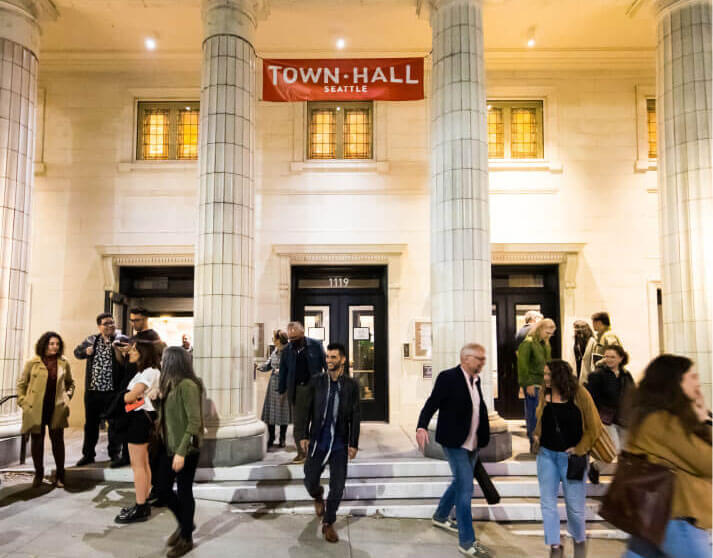About Us
Who We Are
Our Mission
A vibrant gathering place in the heart of Seattle, Town Hall fosters an engaged community through civic, arts, and educational programs that reflect — and inspire — our region’s best impulses: creativity, empathy, and the belief that we all deserve a voice.

Who We Are
Town Hall was founded in 1998 to preserve a beloved historic building and create a shared venue space for the region’s small to midsized arts and civic organizations. After a $35 million top-to-bottom renovation in 2019, Town Hall has matured into a nationally unique artistic and civic hub. More than 100,000 people gather at Town Hall annually for hundreds of self-produced and community-produced events. From book talks and civic panels to chamber music and concerts by globally recognized artists, Town Hall is a space where there truly is something for everyone.
There’s nowhere else like Town Hall Seattle, anywhere. The midsize scale of our performance spaces, our highly collaborative model, wide breadth of programming presented, and deep commitment to accessibility all make us a new kind of cultural convener. With wide open doors and affordable tickets and stages, everyone can take part, be inspired, and use their voice to shape our future.
What We Believe
We believe that everyone deserves access to fresh ideas and artistic expression. That’s why everything from our building’s design and renovation features to our operating models, ticket prices, and approach to digital distribution are built to maximize accessibility. Read our accessibility statement here.
We believe in an equitable Town Hall that belongs to all of us. Town Hall Seattle strives to be an inviting place where everyone feels welcomed and represented regardless of their race, sex, sexual orientation, gender identity, age, national origin, religion, disability, or class.
At the same time, we recognize that structural racism is entrenched throughout U.S. culture and institutions, including our own. Town Hall Seattle has historically been a predominantly white-led organization, and we experience the same outcomes of institutional racism. Therefore, we’ve chosen to address equity through an explicitly (though not exclusively) racial lens. Please read our Racial Equity Statement below to learn more.

Land Acknowledgement
Town Hall’s Spring 2019 Artists/Scholars-in-Residence, Urban Native Education Alliance’s Clear Sky Native Youth Council, created this Land Acknowledgement specific to our building in Downtown Seattle:
“We acknowledge that we are in the homeland of Chief Seattle’s dxw’dəwɁábš (People-of-the-Inside, the Duwamish Tribe of Indians), the First People of this land. The Duwamish are the first Indian Tribe named in the 1855 Point Elliott Treaty’s title. On January 22, 1855, Chief Seattle was the first signatory to the Point Elliott Treaty at Mukilteo. Three other chiefs signed the Point Elliott Treaty on behalf of the Duwamish Tribe. The Duwamish homeland extends from Lake Sammamish west to Elliott Bay, and from Mukilteo south to Federal Way, a total of 54,700 acres.
“The Snoqualmie, Suquamish, Tulalip and Muckleshoot Tribes are also sovereign nations indigenous to Puget Sound. Many people living at these sovereign nations and elsewhere are descendants of the Duwamish Tribe and have ancestral ties to this land.
“We raise our hands to honor Chief Seattle’s Duwamish Tribe of Indians and all descendants of the Duwamish Tribe. We thank them for their hospitality as the First People of this land, and for our continuing use of the natural resources of their Ancestral Homeland.
“Indigenous contributions and sacrifices are immense, and we acknowledge the ongoing disparities, racism, and political invisibility experienced by the Duwamish and other Indigenous Peoples of Puget Sound.”
The UNEA residents also created the verbal land acknowledgement read aloud during the introduction to Town Hall-produced events:
“We acknowledge our institution stands on the unceded traditional territory of the Coast Salish people, particularly the Duwamish. We thank them for our continuing use of the natural resources of their Ancestral Homeland.”
Participants from the UNEA community involved in creating this Land Acknowledgement included Alexander (Assiniboine) , Asia (Cherokee), Alex (Menominee), Akichita (Standing Rock Lakota), Chayton (Hunkpapa Lakota), Cante (Hunkpapa Lakota), Snoqualmie Tribe Chief Andy De Los Angeles, Snoqualmie Tribe member Sabeqwa De Los Angeles, past UNEA program director & Clear Sky Co-Coordinator AJ Oguara (Colville confederated tribes), and past UNEA Elder Tom Speer.
To learn more about the process of developing the Land Acknowledgement, visit the Town Hall blog.
Racial Equity Statement
Structured as a passive recipient of community ideas, we’ve historically relied on existing economic, educational, and socio-political systems that treat white people as the “norm” and Black, Indigenous, and People of Color (BIPOC) as “other.” As a result, we have perpetuated and reinforced racial inequities in our programs, audiences, and leadership. In order to truly become a place where everyone feels welcome and has equitable access to our stages, programs, and engagement opportunities, Town Hall Seattle is intentionally widening our network of collaborators and shifting to a proactive, equity-centered practice across our programming and operations.
We understand that many people hold multiple marginalized identities, and we strive for an intersectional approach in our equity work. Although we are emphasizing racial equity, we are not focusing on it exclusively. To read more about Town Hall’s history and equity journey, click here.
Town Hall is committed to continual progress in making anti-racism, intersectional equity and inclusion part of the fabric of our organization. Currently, we are focusing on:
- Acknowledging that we are on Coast Salish land at the start of all our self-produced events.
- Prioritizing partnerships with BIPOC organizations in our self-produced Town Hall programming.
- Increasing the number of literary bookings and partner events that center conversations about racial equity.
- Producing and hosting a series of public events and workshops designed to offer opportunities for audiences to deepen their own anti-racism education.
- Prioritizing and paying more BIPOC creators to produce Town Hall programs, and amplifying the work of BIPOC communities.
- Creating more opportunities for affordable rentals for BIPOC creators.
- Upholding an equitable Community Code of Conduct (see below) within our building.
- Working with racial equity facilitators to inform our ongoing equity work.
- Completing an annual organization-wide equity audit.
- Providing ongoing staff engagement and training with compensation for that work.
- Reporting annually on our racial equity work through an equity update, our blog, and newsletters.
- Improving methodologies for receiving and responding to feedback from our partners and community members.
- Diversifying our membership base.
- Spotlighting the work of our BIPOC partners to Town Hall members and funders.
- Expanding our network of vendor relationships and promoting the work of our BIPOC vendor partners.
Town Hall seeks active collaboration with our community, and our commitment to racial equity is no different. We ask you to come with us on this journey and invite you to hold us accountable and to reach out to us with feedback and ideas. Please e-mail us at info@townhallseattle.org.
Community Code of Conduct
We believe that together, we can model the kind of society we want to share. Therefore, we ask our community to embrace curiosity, engage thoughtfully with complicated conversations, maintain space for differing points of view, remain open to continual learning, and, above all, treat each other with kindness and respect.
Alongside this approach to creating a welcoming space, we want to make several tenets explicit:
- Hate speech is prohibited on our stages and within our spaces. Hate speech is speech that attacks, threatens, or insults a person or group on the basis of sex, gender, race, sexuality, disability, age, religion, country of origin or background.
- Harassment is not tolerated. This includes, but is not limited to: intimidation or bullying; uninvited physical contact; stalking or following visitors; and verbal comments that reinforce systems of oppression related to sex, gender, race, sexuality, disability, age, religion, background, or any other identity.
- When we disagree, we do so with empathy and civility. Town Hall is a space for a wide breadth of perspectives, ideas, and philosophies, and we value diversity of thought. Town Hall exists as a non-partisan space where people can bring ideas into broad public consideration. We don’t expect to align with every proposition or approach, but we agree to maintain empathy and civility when we disagree.
As outlined in the tenets above, the humanity and civil rights of individuals and communities are never open to challenge. If you experience hate speech or harassment while visiting Town Hall, please speak to a staff member or email us at info@townhallseattle.org so that we may take action.
Thank you! In partnership, we can create and nurture an inclusive environment where everyone’s voice is heard.
Financials
Town Hall Association is a registered 501(c)(3) not-for-profit organization. All donations are tax deductible to the full extend of the law. Town Hall is not affiliated with the City of Seattle or any government agency.